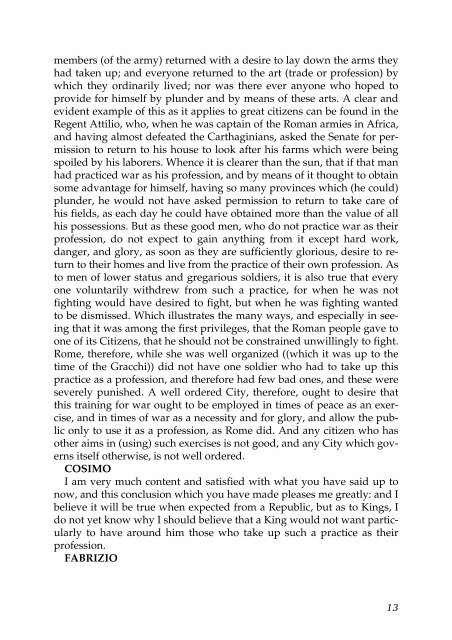Create successful ePaper yourself
Turn your PDF publications into a flip-book with our unique Google optimized e-Paper software.
members (<strong>of</strong> the army) returned with a desire to lay down the arms they<br />
had taken up; and everyone returned to the art (trade or pr<strong>of</strong>ession) by<br />
which they ordinarily lived; nor was there ever anyone who hoped to<br />
provide for himself by plunder and by means <strong>of</strong> these arts. A clear and<br />
evident example <strong>of</strong> this as it applies to great citizens can be found in the<br />
Regent Attilio, who, when he was captain <strong>of</strong> the Roman armies in Africa,<br />
and having almost defeated the Carthaginians, asked the Senate for permission<br />
to return to his house to look after his farms which were being<br />
spoiled by his laborers. Whence it is clearer than the sun, that if that man<br />
had practiced war as his pr<strong>of</strong>ession, and by means <strong>of</strong> it thought to obtain<br />
some advantage for himself, having so many provinces which (he could)<br />
plunder, he would not have asked permission to return to take care <strong>of</strong><br />
his fields, as each day he could have obtained more than the value <strong>of</strong> all<br />
his possessions. But as these good men, who do not practice war as their<br />
pr<strong>of</strong>ession, do not expect to gain anything from it except hard work,<br />
danger, and glory, as soon as they are sufficiently glorious, desire to return<br />
to their homes and live from the practice <strong>of</strong> their own pr<strong>of</strong>ession. As<br />
to men <strong>of</strong> lower status and gregarious soldiers, it is also true that every<br />
one voluntarily withdrew from such a practice, for when he was not<br />
fighting would have desired to fight, but when he was fighting wanted<br />
to be dismissed. Which illustrates the many ways, and especially in seeing<br />
that it was among the first privileges, that the Roman people gave to<br />
one <strong>of</strong> its Citizens, that he should not be constrained unwillingly to fight.<br />
Rome, therefore, while she was well organized ((which it was up to the<br />
time <strong>of</strong> the Gracchi)) did not have one soldier who had to take up this<br />
practice as a pr<strong>of</strong>ession, and therefore had few bad ones, and these were<br />
severely punished. A well ordered City, therefore, ought to desire that<br />
this training for war ought to be employed in times <strong>of</strong> peace as an exercise,<br />
and in times <strong>of</strong> war as a necessity and for glory, and allow the public<br />
only to use it as a pr<strong>of</strong>ession, as Rome did. And any citizen who has<br />
other aims in (using) such exercises is not good, and any City which governs<br />
itself otherwise, is not well ordered.<br />
COSIMO<br />
I am very much content and satisfied with what you have said up to<br />
now, and this conclusion which you have made pleases me greatly: and I<br />
believe it will be true when expected from a Republic, but as to Kings, I<br />
do not yet know why I should believe that a King would not want particularly<br />
to have around him those who take up such a practice as their<br />
pr<strong>of</strong>ession.<br />
FABRIZIO<br />
13
















